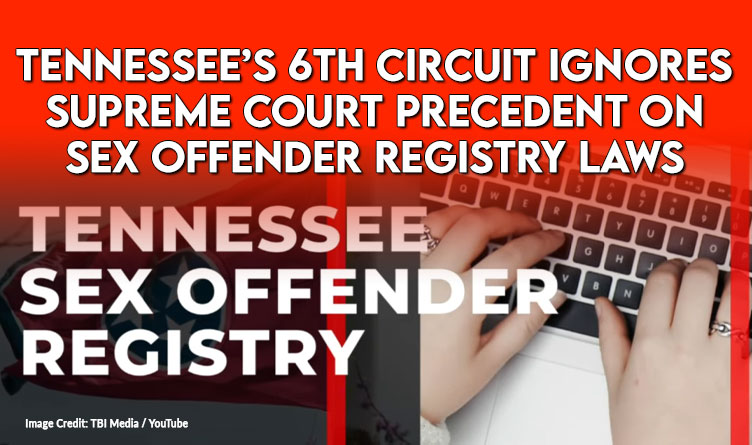Image Credit: TBI Media / YouTube
The Tennessee Conservative [By Kelly M. Jackson] –
Several dozen lawsuits filed against the state of Tennessee alleging that the sex offender registry laws violate the rights of those whose crimes pre-date the registry’s creation in 2004, have been decided with a basis that ignores Supreme Court precedent.
The 6th Circuit federal court and Judge Eli Richardson ruled that to compel a person whose crimes pre-date the registry’s creation violates the law of ex post facto, in that it changes the legal consequences of actions that were committed and may have already been addressed with incarceration and other punitive consequences.
However, the US Supreme court has rejected broad challenges to registration and notification laws in several states where similar types of lawsuits have been filed.

In 2003, in Smith V Doe, the court ruled 6-3, that since the sex offender registry is a civil measure, reasonably designed to protect the general public’s safety, and is not intended as a criminal punishment being applied ex post facto.
The court has determined in cases that include individual 24-hour monitoring, with something like an ankle monitor, or restrictions on offenders which would prohibit the use of social media to be a violation of both 4th and 1st Amendment protections.
The origin of sex offender registry laws are found in the stories of cases where children were sexually assaulted and killed by predators who resided close to their homes. The parents who lobbied for these laws argued that had they been aware of the presence of such a person, they would have made different choices for their families, such as where they live and how much supervision their children would need knowing they were living in the same neighborhood as someone who had a criminally violent past against children.
The most well-known of these types of laws is Megan’s Law, which is named for a seven-year-old girl named Megan Kanka who was raped and murdered by a well-known child molester who had unknowingly moved in across the street. In 1996 a law was passed that gave states the right to establish registries with the purpose of warning communities about sex offenders in the area.

In the United States, loss of rights in the wake of a felony conviction, in particular violent felonies, is not an uncommon reality. While the registry is technically a civil penalty, beyond its primary purpose to keep the public safe, its secondary purpose is arguably meant to act as a deterrent for those who have the potential to offend.
In the state of Tennessee, if any offense of a sexual nature is committed against a person under the age of 14, it automatically lands that person on the registry. If the victim is under the age of 12, the offender is on the registry for life.

Attorneys who represent the offenders in these lawsuits argue that the state has been unsuccessful in empirically proving that the registries reduce the incidences of offense, and because these attorneys intend to keep filing these lawsuits and costing the state money, maybe it will compel the state to change their laws regarding sex offender registries.
According to recent reports, state lawmakers have no intention in making any such changes.
State Rep. William Lamberth, R-Portland, who is a member of the House Criminal Justice Committee, said he feels the General Assembly’s main goal is to “keep Tennesseans safe.” So, while Representative Lamberth hopes to be fair to convicted felons, he said the legislature feels that “there’s nothing that we know of right now that would need to be changed proactively.”


About the Author: Kelly Jackson is a recent escapee from corporate America, and a California refugee to Tennessee. Christ follower, Wife and Mom of three amazing teenagers. She has a BA in Comm from Point Loma Nazarene University, and has a background in law enforcement and human resources. Since the summer of 2020, she has spent any and all free time in the trenches with local grassroots orgs, including Mom’s for Liberty Williamson County and Tennessee Stands as a core member. Outspoken advocate for parents rights, medical freedom, and individual liberty. Kelly can be reached at kelly@tennesseeconservativenews.com.



2 Responses
Every time I make the mistake of thinking Tennessee is a better place to be than other states, I get a rude awakening. How hypocritical can you get. The sex offender registry is pretty clear on what’s constitutes a sexual offense. So why are these “trannies” and their sponsors not on the registry? They are, clearly in violation of Tn. law on myriad points, yet nothing is done about it. If I walk down the street grabbing my gonads at every kid I see or pantomime a sex act with a partner, I’m a pervert and subject to more damn laws than I can count. Yet, here we are holding parades depicting the same things and it’s definitely law and that’s alright. I guess if I paint my face and wear colorful costumes, I could break the law with impunity too. Yeah, right.
So now we know judge Eli Richardson is a pedophile.